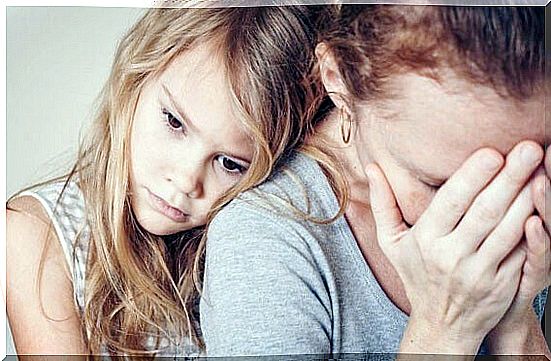Children Of Parents With Paranoid Personality: Emotional Prisons

Children of parents with paranoid personality exist, although they are invisible to society. They suffer the effects of disorganized attachment, emotional instability that leaves marks, and a very exhausting dysfunctional environment. They are children with a higher risk of suffering from mental disorders and who require, together with their families, greater medical-social care.
People with personality disorders, with schizophrenia, with dissociative disorders, etc. they also fall in love, have children, and build families of their own. This is something evident, however, many of them, not having adequate social and family support, lead to extreme situations that remain in the shadows. We talk about problematic dynamics that we are not always aware of.
It is very common, for example, that patients with paranoid personality neglect their treatments and are also characterized by a bad relationship with their environment. All this outlines situations at very complicated moments, where children are undoubtedly the most vulnerable link. Therefore, it is necessary to make these realities that occur daily in our closest settings a little more visible, there where the disease outlines situations that require our attention and sensitivity.

Living with a person with a paranoid personality
To this day, we still do not know what or why this type of disorder develops. In general, it is assumed that it is the result of that complex triad where biological factors, genetic factors and also social factors are added. It should be said that the paranoid personality forms one of the most exhausting psychiatric conditions for several reasons: it affects all areas of the person, making any personal, family and work relationship very difficult.
Let’s see some features:
- They are profiles characterized by permanent mistrust. This disorder begins to show itself in adolescence, at which time they show continuous suspicious behaviors, thinking that others always have bad intentions towards them.
- Continuous suspicion that they will be deceived, betrayed, abandoned …
- Excessive preoccupation with almost any aspect.
- They need continued displays of loyalty and fidelity.
- Mismanagement of their emotions, they are unable to forgive or forget any aspect that they consider an affront, to the point of storing eternal grudges obsessively.
- They are hypervigilant. They always have their radar “on” in the event of any suspicion, danger or threat against them.
- This suspicion also forms in them an often cold and hostile character. They are people who are always on the defensive.

Children of parents with paranoid personality
Several studies have been conducted to find out what the impact of a parent with a paranoid personality is on raising their children. It should be noted, first of all, that the problem in these cases is twofold. We cannot forget that this disorder has a genetic weight, that is, there is an obvious risk that the prevalence of this disease will be transmitted from one generation to another.
However, genetics never determines 100% the risk that we are going to develop a psychological disorder, what determines the most is undoubtedly our environment and the upbringing patterns received. This is where the real problem undoubtedly lies. Let’s see below what scientific research tells us about how children of parents with paranoid personality tend to grow and mature.
Children of parents with paranoid personality: effects on upbringing and education
- At two years of age, children already show a more elusive gaze and less receptivity to external stimuli.
- The insecure, disorganized and stressed attachment determines that these little ones show behavioral patterns based on mistrust, hyperactivity, fear of abandonment, the constant search for comfort …
- Another common factor that characterizes parents with paranoid personality is emotional and educational incongruity. At moments they are very affectionate, then they show coldness and hostility.
- They are inconsistent with the rules and this places high stress on the child’s brain development.
- Children of parents with paranoid personality have low self-esteem and a negative self image.
- Emotional support because parents have overruled their affective and emotional needs from the beginning.
- They generally have a very low school performance.
- When the child becomes aware of his parent’s illness, he usually shows feelings of guilt.
- Parents with paranoid personalities often put walls to their children’s socialization. With this, they seek to prevent them from abandoning them at some point.
- During adolescence, it is common for criminal behaviors to appear, as well as challenging behaviors, anxiety disorders, depression, etc.
Current interventions
Children of parents with paranoid personality undoubtedly need personalized psychosocial intervention. Now, since the effects of an inconsistent and unpredictable family environment are so wide, we cannot be left alone with children. The intervention must extend to the entire environment, including the parents.

- When a couple or a mother with a paranoid personality gives birth, it is necessary to follow a psychotherapy based on the improvement of attachment. The mother or father is encouraged to talk about their own childhood experiences and link these events to their current relationship with their child, enabling them to understand how the disorganized and / or insecure attachment cycle is perpetuated.
- On the other hand, it should also proceed to promote an adequate family psycho-education, where adequate support networks are provided. Thus, dynamics such as the training of family skills or the need to be consistent in terms of affections, norms, routines and habits are essential objectives to be achieved in these family nuclei.
On the other hand, and to conclude, if the children of parents with paranoid personality are older and this problem is detected already in the school environment, the psychological intervention will be very specific. The child or adolescent will be guided to promote good self-esteem, to have a positive relationship with their environment, to ensure that they have healthy interests and also provide them with strategies to reduce the stress caused by the mental illness of one of their parents.
They are how we see very complex situations that require concrete and multidisciplinary support.









